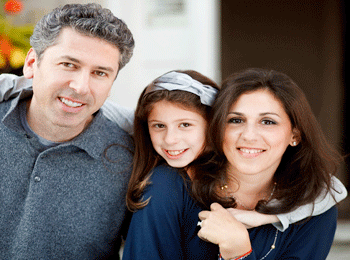Elana Waldman always dreamed of having a big family, but after giving birth to her daughter she found herself unable to conceive.
Waldman, then 32, began fertility treatments for “unexplained secondary infertility,” but nobody thought to pay attention to her family history: her mother had twice survived breast cancer and had tested positive for the BRCA1 mutation, which increases a woman’s lifetime risk of getting breast cancer from 17 per cent to 80 per cent and from seven per cent to 40 per cent for ovarian cancer.
During the course of her routine fertility treatments, her doctor found what she thought were cysts – but turned out to be cancerous tumours.
Waldman, now 38, grew up in Montreal and moved to Toronto to attend Osgoode Hall Law School in 1995, going on to practice family law. It was while working as a lawyer that she met her husband on a blind date. They got married in 2002 and had their daughter in 2003.
In August 2005, Waldman was diagnosed with stage 3 ovarian cancer and given a 30 per cent chance of surviving five years.
“My cancer was found by accident. That’s the problem with ovarian cancer – the symptoms don’t present themselves until the disease is advanced so no one thinks about it. There’s ignorance in the general medical population regarding ovarian cancer. Even when I was diagnosed, my oncologist said I was too young and that it was probably a border-line tumour,” said Waldman.
It was not.
To raise awareness about the disease, Waldman organized events and spoke at different engagements. She started charity events called aWEARnesss, selling donated fashion items at discounted prices, with the money raised going to Princess Margaret Hospital in Toronto. The hospital’s research arm, the Ontario Cancer Institute, has an international reputation as a global leader in the fight against cancer. These events raised more than $500,000 in total.
Three years ago, she was approached by a friend of her husband’s, Leigh Himel, who had seen a video of Waldman speaking for the Israel Cancer Research Fund and wanted to do something to help raise awareness of the disease. Himel works in digital social media and approached Waldam and her husband, Mark, about starting a project called It’s Time To Shout.
This interactive website, which allows women to send in their own stories or the stories of others they know who have had ovarian cancer, aims to educate women about the symptoms of the disease. One of the challenges, as Waldman says in her video on the website, is that “if you’re going to interview people who have ovarian cancer, you’re much harder pressed to find the survivors to do so.
“There is just a lack of awareness – people don’t know the symptoms, and the fact that there is no good diagnostic tool makes it even harder because doctors don’t even think about it when you do have the symptoms,” she said.
Ovarian cancer is called the “silent killer” because too often there are no symptoms until the disease has progressed to an advanced stage. If diagnosed in stage 1, there is a 90 per cent chance of survival, but the problem is that 90 per cent of cases are caught at a later stage.
Waldman hopes that the video will help women and doctors become more informed about the disease and that the money raised can help fund research to find a proper diagnostic tool, which is a main reason for late diagnosis. “The greatest misconception is that a pap smear can detect ovarian cancer, but it can’t,” she said.
“That’s the shame. People don’t know as much about it because it’s not as common as the other cancers, but it’s more deadly than other types.”
More Canadian women die from ovarian cancer than all other gynecologic cancers combined.
Waldman hopes to create something positive from her experience. “If I can turn this into something better, accomplish something, and help make a difference and something positive can come out of this, then that would be great,” she said.
She believes that a breakthrough in ovarian-cancer research is near. “The research that is going on right now in targeted therapy is unbelievable. Whether it’s going to benefit me or the next generation, I don’t know but I feel we’re on the cusp of something major.”
The hardest part for Waldman has not been the physical effects of chemotherapy treatments but the toll the disease takes on her family and, in particular, her daughter, Sydney.
“ My daughter told me she hates cancer because it means she doesn’t have any brothers and sisters. Not much keeps me up in the middle of the night, but worrying about her – and worrying that I passed down the BRCA mutation to her does,” said Waldman.
My daughter told me she hates cancer because it means she doesn’t have any brothers and sisters. Not much keeps me up in the middle of the night, but worrying about her – and worrying that I passed down the BRCA mutation to her does,” said Waldman.
She hopes women become knowledgeable and become their own best advocates, she said. “We need to make our voices heard, we need to not whisper anymore. I say we need to shout.”
For more information, visit www.itstimetoshout.com.
